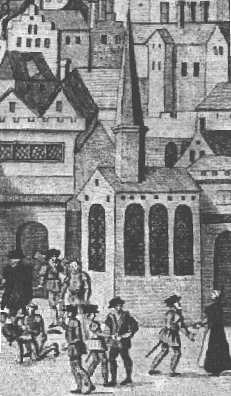Going to church (2)
The church was also used for a variety of secular purposes: social gatherings*, village meetings, ecclesiastical courts, school rooms, storage of archives and fire-fighting equipment. . .
The role of the parish church from the 16th century onward also included care of the poor, maintenance of highways, and control of vermin. In some parishes, the parson was even responsible for keeping a bull and a boar to service the parishioners' cows and pigs.
Relations between parsons and parishoners were sometimes less than ideal, however.
"Slubbering" and other troublesome issues in church.*
Some unorthodox activities at church:
- The curate of Woburn, Bedfordshire, baited a bear in the church in 1612.
- In the parish church at Knottingley, Yorkshire, cock-fights were held regularly on Shrove Tuesday.
- The festivals of the "lord of misrule," held on May Day and Midsummer, featured play-acting of Robin Hood and Little John.
- People grazed their livestock* in the churchyard.
- Market stalls were set up in the churchyard.
- In one parish, it was reported that people who lived around the church were "throwing filth from their houses into the churchyard and on the church path to the great annoyance of persons coming to church."
Footnotes
-
Festivities and festivals
Sundays and holy-days were the only days that members of the parish were free from work and assembled in one place-- the church. They therefore provided occasions for sports and other festivities.
The Puritans especially objected to these activities, which were often accompanied by drunkenness and "many inconveniences which with modesty cannot be expressed," and had participants brought before church courts.
-
Disrespect, slubbering, and so on
George Herbert, the poet, and rector of Bemerton in Wiltshire, had to warn his congregation to say their responses to the service clearly and "not in a huddling, or slubbering fashion, gaping, or scratching the head, or spitting even in the midst of their answer."
There is a record of the conduct of Henry Spinter, Dorset, 1617, who "one Sabath daye a littell before the evening prayer went up into the tower and at a trappe dore did pisse downe upon theare heads in the belfry that they could not stand there nor neare itt to the great offence of those that were present . . ."
The consequences
Public penance, imposed by the ecclesiastical courts, was often conducted in the church. Those judged guilty would have to stand in front of the congregation wearing a white sheet. Men seem to have done less public penance than women, and were often able to get off with a fine instead.
-
Keeping their flocks by night
Country clergymen were often farmers as well. The diary of Ralph Josselin, vicar of Earls Cone, Essex, reflects his divided interests: "Cow calved; administered the sacrament, only 14 present." In some cases, care of livestock interfered with the tending of the spiritual flock. The Vicar of Orford in Norfolk was reported because "the churchyard is not decently kept by reason he keepeth his neate [cattle] there and given them meate there."
